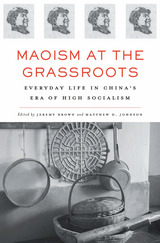

The Maoist state’s dominance over Chinese society, achieved through such watersheds as the Great Leap Forward and the Cultural Revolution, is well known. Maoism at the Grassroots reexamines this period of transformation and upheaval from a new perspective, one that challenges the standard state-centered view. Bringing together scholars from China, Europe, North America, and Taiwan, this volume marshals new research to reveal a stunning diversity of individual viewpoints and local experiences during China’s years of high socialism.
Focusing on the period from the mid-1950s to 1980, the authors provide insights into the everyday lives of citizens across social strata, ethnicities, and regions. They explore how ordinary men and women risked persecution and imprisonment in order to assert personal beliefs and identities. Many displayed a shrewd knack for negotiating the maze-like power structures of everyday Maoism, appropriating regime ideology in their daily lives while finding ways to express discontent and challenge the state’s pervasive control.
Heterogeneity, limited pluralism, and tensions between official and popular culture were persistent features of Maoism at the grassroots. Men had gay relationships in factory dormitories, teenagers penned searing complaints in diaries, mentally ill individuals cursed Mao, farmers formed secret societies and worshipped forbidden spirits. These diverse undercurrents were as representative of ordinary people’s lives as the ideals promulgated in state propaganda.

The year 1949 witnessed China divided into multiple political and cultural entities. How did this momentous shift affect Chinese literary topography? Modernity with a Cold War Face examines the competing, converging, and conflicting modes of envisioning a modern nation in mid-twentieth century Chinese literature. Bridging the 1949 divide in both literary historical periodization and political demarcation, Xiaojue Wang proposes a new framework to consider Chinese literature beyond national boundaries, as something arising out of the larger global geopolitical and cultural conflict of the Cold War.
Examining a body of heretofore understudied literary and cultural production in mainland China, Taiwan, Hong Kong, and overseas during a crucial period after World War II, Wang traces how Chinese writers collected artistic fragments, blended feminist and socialist agendas, constructed ambivalent stances toward colonial modernity and an imaginary homeland, translated foreign literature to shape a new Chinese subjectivity, and revisited the classics for a new time. Reflecting historical reality in fictional terms, their work forged a path toward multiple modernities as they created alternative ways of connection, communication, and articulation to uncover and undermine Cold War dichotomous antagonism.
READERS
Browse our collection.
PUBLISHERS
See BiblioVault's publisher services.
STUDENT SERVICES
Files for college accessibility offices.
UChicago Accessibility Resources
home | accessibility | search | about | contact us
BiblioVault ® 2001 - 2024
The University of Chicago Press









